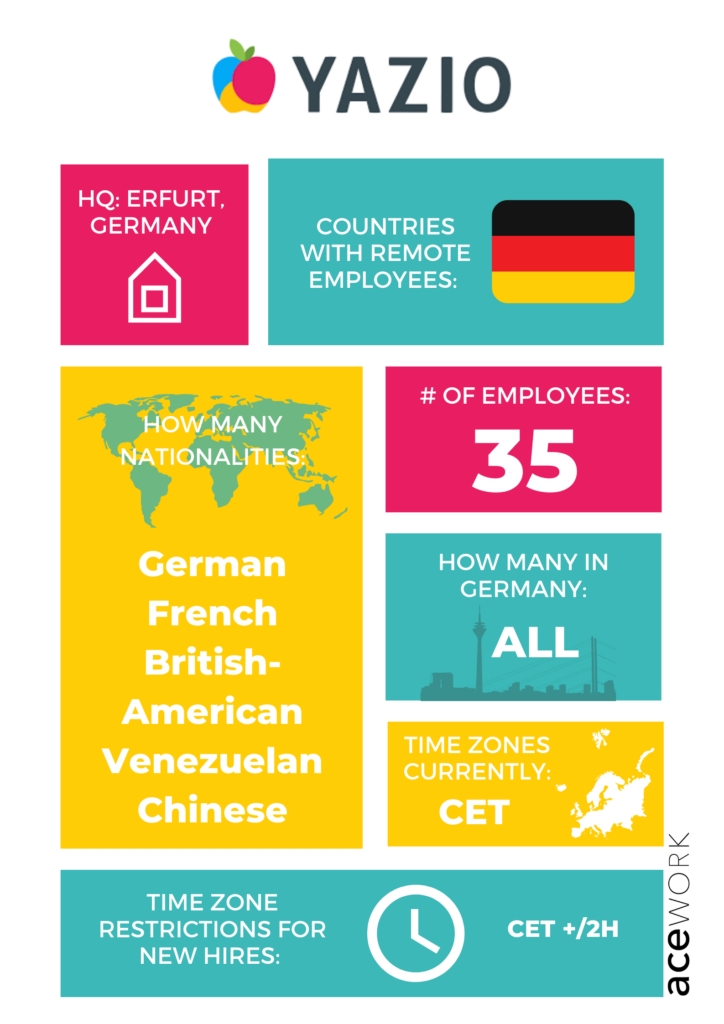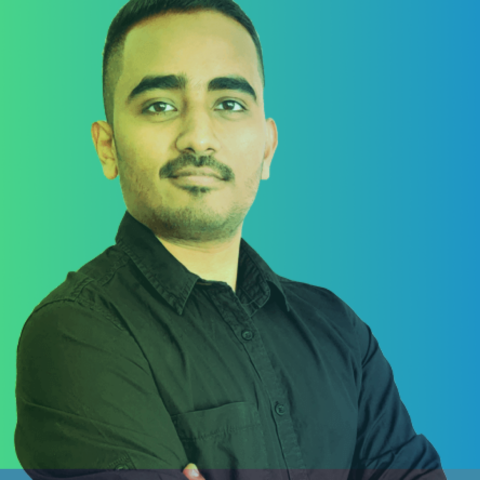While Germany has been named as the second-best place for remote working in Europe, German companies are still slow to adapt to flexible work models. Research shows, that only about 40% of companies allowed employees to work from home in 2019. This number includes both fully and partially remote workers. Some sources even claim that Germans prefer to work from an office. So what is the state of remote work in Germany? We have interviewed the companies the companies leading the remote work movement in Germany to learn from their experience. First up, YAZIO.
YAZIO is an app that counts the calories you’ve consumed and burned throughout the day to give you a clear picture of your habits, offering accurate data to track and tweak along the way to a healthier, happier you.
Company Fact Sheet

- – HQ: Erfurt
- – # of employees: ca. 35
- – Countries of remote employees (where they are located): one (Germany)
- – How many in Germany: all of them
- – How many nationalities: 5 (German, French, British-American, Venezuelan, Chinese)
- – Time zones currently: CET
- – Time zone restrictions for new hires: CET +/-2h
Interview with Vanessa Göcking, HR and Communications at YAZIO
How distributed is the team at YAZIO? Would you consider yourselves “remote-first”, and if yes, what does that mean for you?
At YAZIO, roughly 30% of our team members work at our headquarters in Erfurt, whereas approx. 70% work remotely (either from home or a co-working space), with a growing share of remote team members. This is why we would consider YAZIO a remote-first company. Our remote culture is reflected clearly in our company structure, daily processes, communication methods, and IT tools and infrastructure.
How would you describe your remote work culture? What are your core values, and how are they expressed in your culture?
Our remote culture is based on flexibility, trust and efficiency. Not only do we allow flexibility in choosing our work location, but also working hours. Apart from our core working hours (11:00 to 15:00), employees are free to work at their preferred hours. All team members track their working time and we trust that every team member is working to get the most out of his or her time and to bring YAZIO to the next level. In addition, we love and live flat hierarchies and fast, efficient processes. In short: A hands-on and get-stuff-done mentality.
What influenced Yazio’s decision to become a distributed team?
We want to hire the most motivated and skilled talent, regardless of whether they are living in Erfurt, Berlin, or some village in the middle of nowhere. With the right processes and communication tools, distributed teams can work as effectively and efficiently as teams that are working in the same place—or even more so. That’s why we believe in this new form of working.
Please share some of the challenges you have encountered along the way. How did you overcome them?
For remote companies, it certainly is a challenge to make sure that each employee feels like they are part of a team and feels a connection to his or her co-workers as well as the company itself. Thus, we offer several team getaways and events per year where the entire team comes together for activities like hiking, mountain biking, yoga, or simply relaxing together. We also have specific Slack groups to discuss non-business-related things like movie recommendations. Moreover, we introduced Donut Dates, where a Slack bot randomly selects two or three team members to (e-)meet and learn more about each other’s roles and interests.
What does your hiring process look like? Has it changed from when you didn’t consider remote candidates?
The first step is a 30-minutes Zoom call with Vanessa, our HR and Communications Manager. If everything goes smoothly, the candidate is presented with a case study to complete at home. Next, there is a Zoom call with the respective team lead and possible trial day. Our hiring process continues to evolve as we find the best ways to determine both a personal/cultural fit as well as the candidates’ knowledge and position-related skills.
The foundation for successful remote work lies in clear structures, processes, and systems for a.) collaboration, b.) communication and c.) documentation.
Can you explain what each of those looks like at YAZIO?
Clear and consistent structures, processes, and systems are indeed the most important aspects for us. We communicate mainly in a written manner via Slack and use different channels to separate topics. Also, we have specific Slack guidelines regarding how and where to post information and questions and how to use threads. Furthermore, we use video calls to keep in touch and discuss more complicated matters. However, we try to have as few meetings as possible and only with the team members that are essential for a given topic. We do not have daily stand-ups or similar. We structure our tasks using Trello and document our results in Google Drive.
Interested to work at YAZIO? Prove that you are ‘remote ready’ and apply directly through acework. Sign up here to start your application process.






